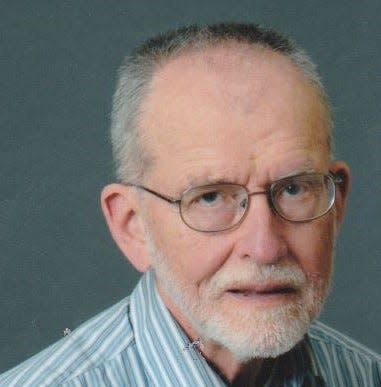Paul deLespinasse: Nature abhors a (political) vacuum
- Oops!Something went wrong.Please try again later.
Events in Russia and Haiti remind us of the interesting relationship between government and organized crime.
In Haiti, criminal gangs polished off its feeble government and now seek representation in a replacement regime.
Julia Navalnaya, widow of Russian dissident Alexei Navalny, wrote in the Washington Post that "Vladimir Putin is not a politician, he's a gangster."
She went on: "Alexei Navalny became famous in Russia and hated by Putin precisely because ... he openly described Putin and his allies as gangsters who had seized and used power only for their own enrichment and to fulfill their personal ambitions."

Navalnaya's argument makes some sense, but falsely assumes a sharp distinction between organized crime and government.
Government apparently originated in organized crime, which could spring up even in the "state of nature" before any governments existed. The emergence of legitimate government from its unappetizing childhood was a gradual process. It is impossible to say exactly where to draw the line between them.
Some political philosophers have argued instead that governments were created by a "social contract." But how could people have intentionally agreed to create a government before any existed? They would have had no idea of what government would be like.
The state of nature offers ample opportunity to create protection rackets. These small groups of unscrupulous individuals offer not to kill their neighbors if their neighbors pay them off. It beats working for a living!
Legitimate government is not created directly. Instead, it results from prolonged intelligent resistance to the organized criminals, gradually forcing concessions that reduce their obnoxiousness.
Legitimate government arrived in some parts of the world sooner than others, in still other places, not yet.
When government disappears, its country reverts to the state of nature. Since nature abhors a political vacuum, organized crime will once again fill that vacuum.
This is what is happening in Haiti. This is what happened after the Soviet government collapsed in 1991.
After the collapse, a former student of mine was in Ukraine gathering material for his doctoral dissertation. He reported that the hotel he lived in was run by the local Mafia. When I asked if this had been a problem, he replied that when people found out where he was living, they didn't give him any trouble!
He was under Mafia protection.
This response reminds us that even though organized crime is in business strictly for its own benefit (as Julia Navalnaya noted), it still provides stability to the population it is exploiting. As Charles A. Beard noted, "the bee fertilizes the flower it robs."
Even an unjust order is far preferable to living in a total Hobbesian nightmare, where life is "a war of all against all" and "nasty, brutish, and short."
Vladimir Putin helped end the chaos prevailing after the Soviet Union collapsed in 1991. This was a real service for which, gangster or not, he deserves some credit. His actions were more relevant than his motives.
But one wishes that Putin could have responded more positively to Russians seeking the rule of law and democracy, once he had put some order back in place and gotten the economy going again.
One wishes he could have stopped imprisoning or bumping off political opponents. One wishes he had not attacked Ukraine.
Rome was not built in a day, and Russia probably will not enjoy a more legitimate government in the near future. Once again, it will take years of intelligent resistance to particular outrages to convert its regime from its current resemblance to organized crime into a fully legitimate government.
This is a job for Russia's own people and cannot be done by outsiders.
And what about Haiti? Life there today is certainly "nasty, brutish and short." I hate to say this, but it may take someone like Vladimir Putin to put an end to the anarchy and allow gradual progress toward legitimate government to begin.
— Paul F. deLespinasse is professor emeritus of political science and computer science at Adrian College. He can be reached at pdeles@proaxis.com.
This article originally appeared on The Holland Sentinel: Paul deLespinasse: Nature abhors a (political) vacuum
